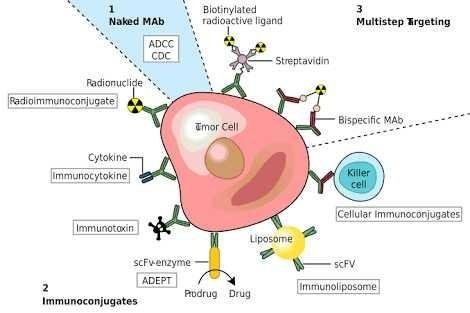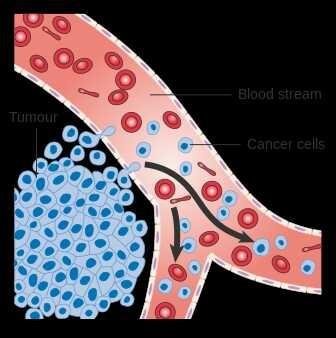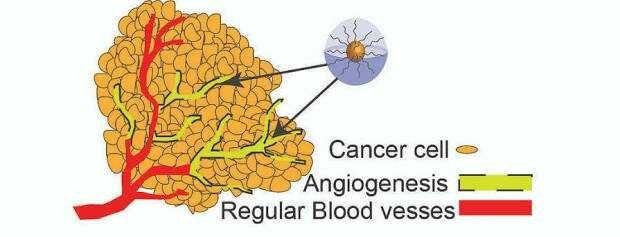 By Ch1902 vector, Ramujana original raster - CC BY-SA 3.0, Link
By Ch1902 vector, Ramujana original raster - CC BY-SA 3.0, Link Since the earliest evident discovery of cancer in human mummies, which dates to ancient Egypt, science and medicine have never for one moment, relented in their effort in development of cancer treatment and prevention. There has been lots of progress on cancer treatment so far, ranging from chemotherapy, radiation, down to surgery and other forms of cancer treatment. However, there has been one major "worry" factor, which happens to be the side effect of these treatment - Collateral damage of healthy, non-cancer cells. Targeted therapy is now a major pillar in the evolving world of "Precision medicine" which according to the Precision Medicine Initiative, is described as "an emerging approach for disease treatment and prevention that considers individual variability in genes, environment, and lifestyle for each person." The aim of this post is to inform/educate everyone on a recent development in cancer treatment, with emphasis on latest advances in cancer treatment regiments, called targeted cancer therapy.
Written by: @akiripromise
Cancers
 This diagram shows cancer cells flowing into the blood stream - CC BY-SA 3.0, Link
This diagram shows cancer cells flowing into the blood stream - CC BY-SA 3.0, LinkCarcinoma
Carcinomas are cancers originating from the epithelial tissues (Tissues that are specifically designed to cover the organs in the human body), mostly occurring in certain parts of the body like lungs, breasts, pancreas and other organs.
Sarcoma
Sarcoma is a Greek word that means "fleshy growth". This kind of cancer affects mostly the connective tissues in the human body, some examples include: blood vessels, bones, cartilage, etc.
Melanoma
Melanoma is the most aggressive form of skin cancer that originates from uncontrolled growth of melanocytes.
Lymphoma
As the name implies, lymphoma is the cancer of white blood cells (lymphocytes). This type of cancer can occur in any part of the human body, especially because there are lymph nodes at almost every part of our bodies.
Leukemia
White blood cells like we all know, fights infections and they originate in hematopoietic tissues, such as bone marrow and the lymphatic system. When there is too much production of these injured or damaged white blood cells in those tissues, it leads to leukemia
Brain and spinal cord cancer
Also known as the central nervous system (CNS) cancers. In most of the cases, they develop from supporting cells of the CNS, called glial cells.
Introducing Targeted Cancer Therapy
The role of other forms of cancer treatments like chemotherapy, radiation, surgery, should not be underestimated, as they are very important, and has helped lots of individuals suffering from cancer. However, researchers/scientists are constantly looking out for better ways to fight this deadly disease called cancer. Targeted cancer therapy or molecularly targeted therapies, are used to slow the growth of cancer, destroy cancer cells, and relieve most of the symptoms caused by cancer. Currently, biotech companies are working on development of this therapeutic approach, because it confers a significant level of precision when it comes to targeting cancer cells. Even though much research on the subject matter is still ongoing, Food and Drug Administration (FDA) has approved targeted therapeutic approach for treatment of specific cancer types.
Distinct Types of Targeted Cancer Therapy
Majority of targeted therapies fall under two major groups.
Targeted therapy drugs are mostly grouped based on how they work or the kind of protein they are targeting. We must note that some targeted therapy drugs belong to more than one category.
1. Monoclonal antibodies:
 CC BY-SA 3.0, Link
CC BY-SA 3.0, LinkThese types of antibodies are too large to enter the cells. Therefore, they are designed to attach to the walls of the cells. Like I earlier mentioned, lots of effort are being made to improve cancer diagnosis and treatment. One of the most effective/recent method of treating cancer, is the use of monoclonal antibody drugs. In this case, the human natural immune system functions are used to combat cancer.
Relationship Between the Immune System & Monoclonal Antibody Drugs
Basically, the immune system is the military force of the body. It is designed to defend the body against invaders/infectious organisms that has the capacity to harm the body. Examples include: bacteria, parasites, fungi, viruses, etc. The immune system comprises of antibodies that calls the attention of molecules that fight/eliminate diseases, by drawing itself to the antigen on the body of a cell. As powerful as the human immune system, it often can barely match the force of cancer cells.
The working principle of the immune system is incredible, they are not just strong enough to fight/eliminate cancer cells. Hence in equivalent manner, monoclonal antibodies are scientifically designed to replace these antibodies in the immune system. The principle is mimicked, but the fighting agents are replaced with monoclonal antibody drugs.
As effective as monoclonal antibody treatment system, it is not designed for all cancers. Below, are certain cancers that have been approved to employ the monoclonal antibody treatment
- Lung cancer
- Prostate cancer
- Brain cancer
- Stomach cancer
- Melanoma
- Breast cancer
- Lymphocytic leukemia
- Hodgkin's and Non-Hodgkin's lymphoma
- Head and neck cancers
- Colorectal cancer
2. Small molecules drugs:
 CC BY-SA 3.0, Image Link
CC BY-SA 3.0, Image LinkThis operates in a format that is totally different from the monoclonal antibodies method of operation. In this case, the drugs are way smaller than the cells, so they pass through the cell membrane. They go ahead to attach to the proteins inside the cell and block their actions.
Unlike the case of monoclonal antibody treatment, where monoclonal antibodies are introduced to the body via the veins, small molecule drugs are pills taken orally. Most of the recent targeted therapy advancements in the world, are focused on small molecule inhibitors, because it has been proven to be one of the most effective ways of fighting cancer.
Recall, I earlier explained how monoclonal antibody treatment uses the principle of the body's immune system functions. This is totally different in the case of small molecule drugs, small molecule drugs uses the body protein principles to combat cancer. A typical example of this type of therapy is "Angiogenesis". All tumors need nutrients, blood supply, air, to thrive. They are made available to tumors via blood vessels. This is where anti-angiogenesis comes in, particularly to make sure the nutrients don't get to the tumors via the blood vessels, by killing the developmental process of the blood vessel supplying nutrients to that dysfunctional cell.
The nomenclature of any targeted agent is always related to the kind of cell it targets. For example, most monoclonal antibodies always have the stem "-mab" at its end. This is to indicate that the agent has antibody properties, hence its a monoclonal antibody. On the hand, most small molecule drugs always have the stem "Ib" at its end, indicating that the agent has protein properties.
Others Include:
- Tyrosine kinase inhibitors
- Apoptosis-inducing drugs
- Angiogenesis inhibitors
- mTOR inhibitors
- Hormonal therapies
Side Effects of Targeted Cancer Therapy
Even though targeted therapies are currently the safest way to treat cancer and do not have much side effects like in the case of chemotherapy, it still has its own shortcomings. Note also, that these side effects are mild and tend to go away once the body gets used to drug.
There are short-term side effects and long-term side effects in targeted therapy. Just as our faces are different, different individuals also have diverse ways in which they respond to treatment. Targeted therapy should target cancer cells, and rarely affects other nearby cells. The side effects of targeted therapy depend hugely on the type of drug, combination of drugs or treatment, mode of receiving the drug (mouth or vein), patients health status prior to treatment. The side effects include:
- Skin rashes
- Allergic reactions
- Fatigue
- High blood pressure
- Blood cloths
- Slow wound healing
- Vomiting and nausea
In as much as these could be long- or short-term, they can also be managed by following a healthy diet, exercising, rest. Its also advised you stop smoking and alcohol consumption.
Differences Between Targeted Cancer Therapy and Chemotherapy
Even though they both involve the use of drugs to fight cancer, there are some clear-cut differences between these two approaches
Targeted therapies mostly block tumor cell proliferation (cytostatic), while chemotherapy agents are aimed at killing tumor cells (cytotoxic).
Cellular and molecular differences - Targeted therapies are molecularly targeted drugs, meaning they act on molecular targets that are cancer associated, while chemotherapy has influence on both dividing normal cells and cells that are cancerous.
Conclusion
It is the birth of a whole new era in the world of cancer treatment. In a world of evolving targeted treatments, Targeted cancer therapy is at the forefront of precision medicine.
Drugs can now be matched to specific cancerous growths, cutting down on a lot of side effects.
I am particularly interested in this, because it will by far extend the survival rate of thousands of individuals suffering from cancer round the world, decreasing worldwide cancer death rate
Thank you,
@akiripromise
References
[Chemotherapy, what to expect](https://en.m.wikipedia.org/wiki/Cancer
https://www.webmd.com/cancer/chemotherapy-what-to-expect)
Chemotherapy how it works and how you will feel
Understanding targeted therapy
Side effect of Targeted therapy
An Overview of targeted cancer therapy
Overview of targeted therapies for cancer
Did you know there is a group of forward thinking individuals with the goal of increasing both the quality as well as visibility of Science, Technology, Engineering and Mathematics (STEM) posts on Steemit? well, now you know. The name of our community is @steemSTEM. If you blog, or are interested in professionally blogging on any of the areas mentioned above, do well well to join our discord channel. For more details about the @steemStem community, click here. Furthermore, you can also include the tag #stemng on your post, if you are from Nigeria. Click here for more information about @stemng.

Insightful writeup on cancer therapy, impressive.
Downvoting a post can decrease pending rewards and make it less visible. Common reasons:
Submit
Thanks to help for us.
Downvoting a post can decrease pending rewards and make it less visible. Common reasons:
Submit
you are welcome @parthajit12, I am glad I could be of much help
Downvoting a post can decrease pending rewards and make it less visible. Common reasons:
Submit
Some few lessons still to be learnt on markdown styling. Feel free to talk to your mentor.
Downvoting a post can decrease pending rewards and make it less visible. Common reasons:
Submit
Thanks bro, on it
Downvoting a post can decrease pending rewards and make it less visible. Common reasons:
Submit
Nice job, information on cancer is priceless.. Thank you bro👍
Downvoting a post can decrease pending rewards and make it less visible. Common reasons:
Submit
I am glad I could be of help @Tekadii. It just pains me that Nigeria is still struggling with chemotherapy. I hope we leave politics a little and focus on the real deal someday
Downvoting a post can decrease pending rewards and make it less visible. Common reasons:
Submit
Yeah, I hope so too.
Downvoting a post can decrease pending rewards and make it less visible. Common reasons:
Submit
I am glad I could be of help @Tekadii. It just pains me that Nigeria is still struggling with chemotherapy. I hope we leave politics a little and focus on the real deal someday
Downvoting a post can decrease pending rewards and make it less visible. Common reasons:
Submit
A good read. Targeted cancer therapy sounds like the real deal but I wish its effect was cytotoxic and not just “cytostatic”. This way it would offer more promise. Let’s see how this area of precision medicine advances anyway.
Downvoting a post can decrease pending rewards and make it less visible. Common reasons:
Submit
Like I said, its still in an evolving state. Thanks for stopping by bro
Downvoting a post can decrease pending rewards and make it less visible. Common reasons:
Submit